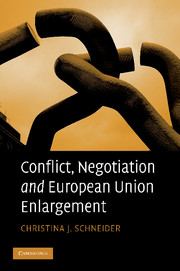Book contents
- Frontmatter
- Contents
- List of Illustrations
- List of Tables
- List of Acronyms
- Acknowledgements
- 1 Introduction
- 2 EU enlargements and transitional periods
- 3 A rationalist puzzle of EU enlargement?
- 4 A theory of discriminatory membership
- 5 EU enlargement, distributional conflicts, and the demand for compensation
- 6 The discriminatory of membership
- 7 Discriminatory membership and intra-union redistribution
- 8 Conclusion
- Bibliography
- Index
1 - Introduction
Published online by Cambridge University Press: 17 July 2009
- Frontmatter
- Contents
- List of Illustrations
- List of Tables
- List of Acronyms
- Acknowledgements
- 1 Introduction
- 2 EU enlargements and transitional periods
- 3 A rationalist puzzle of EU enlargement?
- 4 A theory of discriminatory membership
- 5 EU enlargement, distributional conflicts, and the demand for compensation
- 6 The discriminatory of membership
- 7 Discriminatory membership and intra-union redistribution
- 8 Conclusion
- Bibliography
- Index
Summary
“We are here to undertake a common task – not to negotiate for our own national advantage, but to seek it to the advantage of all”
(Jean Monnet)The enlargement of the European Community (EC) and later the European Union (EU) was never particularly popular. Indeed, the first attempt at widening the EU culminated in the Community's “first real crisis” when Charles de Gaulle, then-President of France, rejected the British accession in a dramatic press conference at the Élysée Palace (Nicholson and East 1987, 39). He claimed that Britain's conditions for joining the Union were unacceptable to France. In addition to fearing that a rise in Atlanticism would undermine French dominance in Europe, de Gaulle was particularly concerned about the impact British membership would have on the Common Agricultural Policies (CAP). Political tensions arose from opposite interests of French farmers and the British government that sought to protect the interests of European Free Trade Association (EFTA) members, British farmers, and the Commonwealth. Moreover, it seemed impossible to compromise on granting the Commonwealth access to the common market without hurting the French interest in protecting European farmers from non-European producers. To make matters worse, the expansion of the common market to the Commonwealth would decrease France's benefits from preferential agreements with its former colonies (Ludlow 1997, 159).
- Type
- Chapter
- Information
- Conflict, Negotiation and European Union Enlargement , pp. 1 - 11Publisher: Cambridge University PressPrint publication year: 2008

